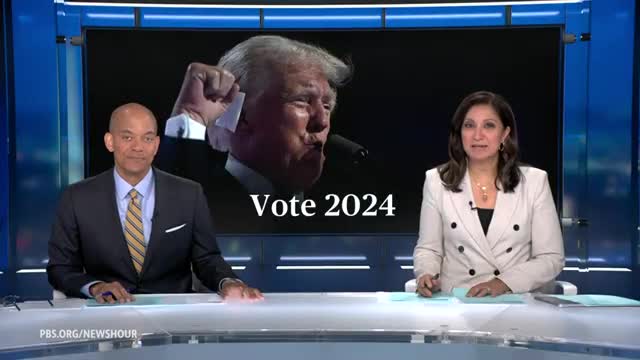Trump dominates GOP convention amid rising Democratic dissent

This article was created by AI summarizing key points discussed. AI makes mistakes, so for full details and context, please refer to the video of the full meeting. Please report any errors so we can fix them. Report an error »

In a week marked by significant political developments, the Republican National Convention concluded in Milwaukee with former President Donald Trump securing his third presidential nomination. This milestone places him among a select group of six Americans to achieve such a feat for a major party. The event was characterized by a vibrant atmosphere, complete with celebratory balloons and a rallying cry for \"Trumpomania\" as Trump took the stage.
During his lengthy acceptance speech, which lasted 92 minutes—the longest in modern political history—Trump initially adopted a unifying tone, emphasizing a shared American destiny. However, he quickly reverted to familiar campaign rhetoric, making claims about the economy and crime rates that have been challenged by fact-checkers. For instance, while Trump asserted that his presidency saw the \"most secure border and best economy,\" experts noted that metrics such as unemployment and wage growth during his tenure do not support these assertions.
Trump's speech also included references to his recent assassination attempt, which he described in dramatic terms, and he criticized the justice system, implying that his legal troubles are politically motivated. Notably absent from his speech were direct mentions of his 34 felony convictions related to falsifying business records.
The convention featured other prominent figures, including Trump's son Eric, who defended his father and criticized cultural changes, and Tucker Carlson, who praised Trump’s leadership. Melania Trump made a notable appearance, receiving warm applause from the crowd.
Meanwhile, the Democratic Party is facing internal divisions regarding President Joe Biden's candidacy. Over ten congressional Democrats have publicly called for Biden to step aside, although his campaign insists he remains committed to running. Campaign chair Jen O'Malley Dillon acknowledged recent challenges but expressed confidence in Biden's ability to win.
Despite the calls for Biden to withdraw, some party leaders, including House Minority Leader Hakim Jeffries, continue to support him. However, there is a growing sense of urgency among Democrats to resolve the leadership question, with many seeking clarity by early next week. Potential alternatives to Biden include Vice President Kamala Harris, Pennsylvania Governor Josh Shapiro, and Michigan Governor Gretchen Whitmer, though no consensus has emerged.
As the political landscape evolves, both parties are gearing up for a contentious election season, with Trump and Biden at the forefront of their respective campaigns.
During his lengthy acceptance speech, which lasted 92 minutes—the longest in modern political history—Trump initially adopted a unifying tone, emphasizing a shared American destiny. However, he quickly reverted to familiar campaign rhetoric, making claims about the economy and crime rates that have been challenged by fact-checkers. For instance, while Trump asserted that his presidency saw the \"most secure border and best economy,\" experts noted that metrics such as unemployment and wage growth during his tenure do not support these assertions.
Trump's speech also included references to his recent assassination attempt, which he described in dramatic terms, and he criticized the justice system, implying that his legal troubles are politically motivated. Notably absent from his speech were direct mentions of his 34 felony convictions related to falsifying business records.
The convention featured other prominent figures, including Trump's son Eric, who defended his father and criticized cultural changes, and Tucker Carlson, who praised Trump’s leadership. Melania Trump made a notable appearance, receiving warm applause from the crowd.
Meanwhile, the Democratic Party is facing internal divisions regarding President Joe Biden's candidacy. Over ten congressional Democrats have publicly called for Biden to step aside, although his campaign insists he remains committed to running. Campaign chair Jen O'Malley Dillon acknowledged recent challenges but expressed confidence in Biden's ability to win.
Despite the calls for Biden to withdraw, some party leaders, including House Minority Leader Hakim Jeffries, continue to support him. However, there is a growing sense of urgency among Democrats to resolve the leadership question, with many seeking clarity by early next week. Potential alternatives to Biden include Vice President Kamala Harris, Pennsylvania Governor Josh Shapiro, and Michigan Governor Gretchen Whitmer, though no consensus has emerged.
As the political landscape evolves, both parties are gearing up for a contentious election season, with Trump and Biden at the forefront of their respective campaigns.
View full meeting
This article is based on a recent meeting—watch the full video and explore the complete transcript for deeper insights into the discussion.
View full meeting